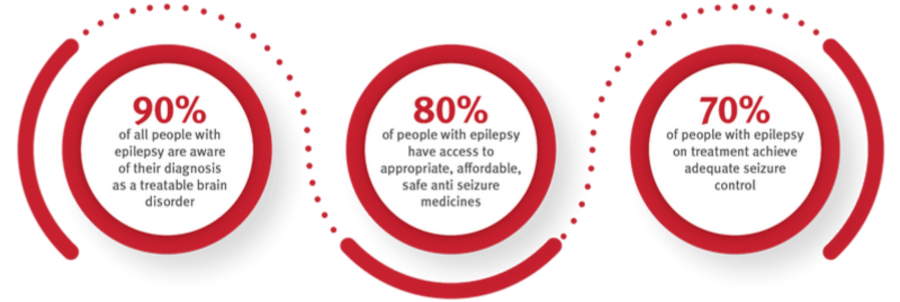
Intersectoral global action plan on epilepsy and other neurological disorders. View on ILAE Website
In November 2020, the Seventy-third World Health Assembly (WHA) adopted resolution WHA 73.10 on Global actions on epilepsy and other neurological disorders to develop an Intersectoral global action plan on epilepsy and other neurological disorders (IGAP) in consultation with Member States. The action plan will address the challenges and gaps in providing care and services for people with epilepsy and other neurological disorders that exist worldwide and ensure a comprehensive, coordinated response across sectors.
ILAE and IBE jointly advocated for a 90-80-70 cascade target for epilepsy to be included in the IGAP to inspire a decade of action and achieve meaningful improvements in care and treatment for all of the 50 million plus people who live with epilepsy globally.
In May 2022, during the 75th World Health Assembly in Geneva, Switzerland, four international organizations and 116 Member States spoke in support of the IGAP. On 27 May 2022, WHO Member States unanimously approved the plan.
To meet the global targets, IGAP includes proposed actions for WHO Member States, the WHO Secretariat, and national and international partners in several areas:
Access to services for epilepsy – Approximately 70% of people with epilepsy can be seizure free with treatment. However, treatment gaps exist in every country in the world. The current treatment gap estimate is 75% in lower-income countries and is substantially higher in rural areas.
Engagement and support for people with epilepsy – People with epilepsy and their families are stigmatized and discriminated against as a result of the misconceptions and negative attitudes that surround epilepsy. This leads to human rights violations and social exclusion. In some settings, children with epilepsy may not be allowed to attend school; adults may not be able to find suitable employment or to marry.
Epilepsy as an entry point for other neurological disorders – Epilepsy can be secondary to other neurological conditions, such as stroke or traumatic brain injury. It also can occur along with other conditions; for example, 19% of people with epilepsy also have migraine, and about 26% of adults with epilepsy also have intellectual disability.
With support, the IGAP will help to strengthen the prevention, detection, care, treatment, and equal opportunities for people with epilepsy and other neurological disorders worldwide.
